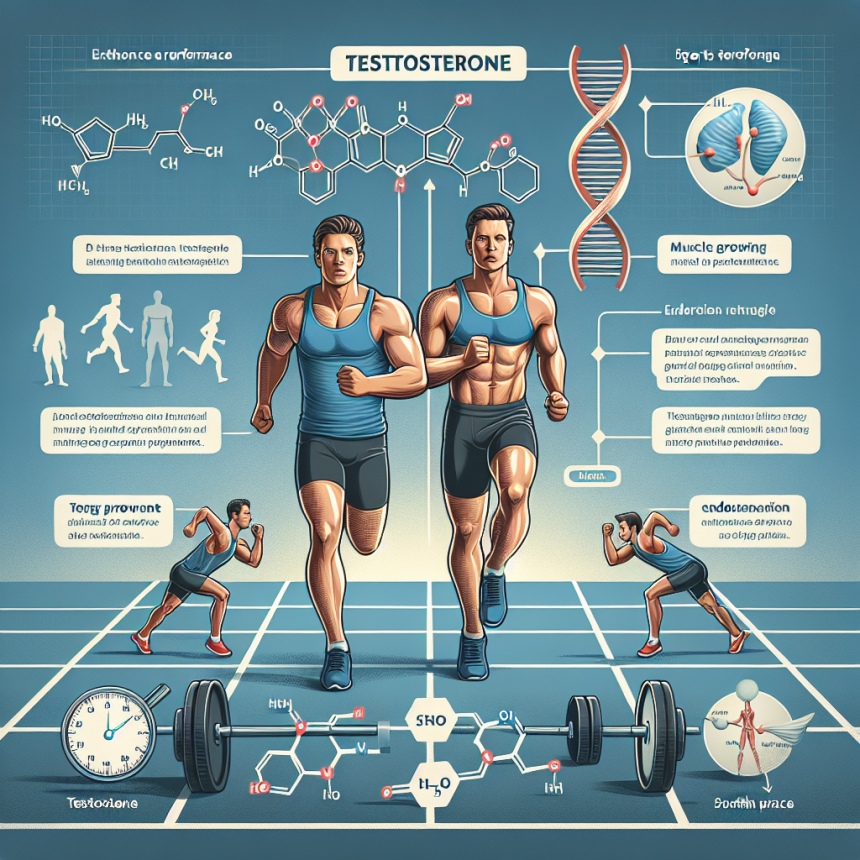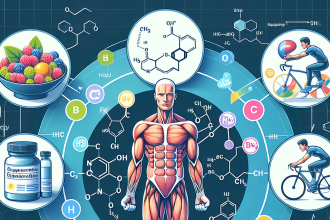-
Table of Contents
The Role of Testosterone in Enhancing Sports Performance
Testosterone, a hormone primarily produced in the testicles, has long been associated with male characteristics such as strength, muscle mass, and aggression. It is also known to play a crucial role in sports performance, with many athletes turning to testosterone supplementation to gain a competitive edge. However, the use of testosterone in sports has been a controversial topic, with concerns about its potential for abuse and unfair advantage. In this article, we will explore the role of testosterone in enhancing sports performance and its impact on athletes.
The Science Behind Testosterone
Testosterone is a steroid hormone that belongs to the androgen group. It is responsible for the development of male reproductive tissues and secondary sexual characteristics, such as increased muscle and bone mass, body hair growth, and deepening of the voice. In men, testosterone is primarily produced in the testicles, while in women, it is produced in smaller amounts in the ovaries and adrenal glands.
Testosterone levels in the body are regulated by the hypothalamus and pituitary gland. The hypothalamus releases gonadotropin-releasing hormone (GnRH), which stimulates the pituitary gland to produce luteinizing hormone (LH) and follicle-stimulating hormone (FSH). LH then signals the testicles to produce testosterone. This delicate balance of hormones is essential for maintaining normal testosterone levels in the body.
Testosterone is also known to have anabolic effects, meaning it promotes the growth of muscle tissue. It does this by binding to androgen receptors in muscle cells, stimulating protein synthesis and increasing muscle mass. This is why testosterone is often used by athletes to enhance their physical performance and improve their muscle strength and size.
The Impact of Testosterone on Sports Performance
Testosterone has been shown to have a significant impact on sports performance, particularly in activities that require strength and power. Studies have found that testosterone supplementation can increase muscle mass, strength, and athletic performance in both men and women (Bhasin et al. 2001). It has also been linked to improved recovery time and reduced muscle damage after intense exercise (Kraemer et al. 1996).
One of the most significant benefits of testosterone in sports is its ability to increase muscle mass. This is especially beneficial for athletes who participate in strength-based sports, such as weightlifting, powerlifting, and bodybuilding. By increasing muscle mass, testosterone can improve an athlete’s strength and power, allowing them to lift heavier weights and perform better in their sport.
Testosterone has also been shown to improve athletic performance in endurance-based sports. A study by Bhasin et al. (1996) found that testosterone supplementation increased muscle strength and endurance in men, leading to improved performance in cycling and running. This is because testosterone can increase the production of red blood cells, which are responsible for carrying oxygen to the muscles. This, in turn, can improve an athlete’s endurance and stamina.
Moreover, testosterone has been linked to increased aggression and competitiveness, which can be beneficial in sports that require a high level of intensity and drive. It has also been shown to improve an athlete’s mood and motivation, leading to better focus and performance on the field or court (Kraemer et al. 1996).
The Controversy Surrounding Testosterone Use in Sports
Despite the potential benefits of testosterone in sports, its use has been a subject of controversy. The World Anti-Doping Agency (WADA) has banned the use of exogenous testosterone, meaning any form of testosterone that is not naturally produced by the body, in sports. This is because testosterone supplementation can give athletes an unfair advantage over their competitors and can be considered a form of cheating.
Moreover, the use of testosterone in sports has been linked to several adverse effects, including liver damage, cardiovascular problems, and hormonal imbalances. It can also lead to the suppression of natural testosterone production in the body, which can have long-term consequences on an athlete’s health and well-being.
There have also been concerns about the abuse of testosterone in sports, with some athletes using it in excessive amounts to gain a significant advantage over their competitors. This has led to calls for stricter regulations and testing to prevent the misuse of testosterone in sports.
The Future of Testosterone in Sports
Despite the controversy surrounding its use, testosterone continues to be a popular performance-enhancing drug in the world of sports. However, with advancements in technology and testing methods, it has become increasingly challenging for athletes to use testosterone without getting caught. This has led to a shift towards more natural and legal methods of increasing testosterone levels, such as through diet and exercise.
Furthermore, there is ongoing research into the development of safer and more effective forms of testosterone supplementation that can provide the benefits without the adverse effects. This could potentially lead to a future where testosterone use in sports is allowed under strict regulations and monitoring.
Expert Comments
“Testosterone is a powerful hormone that can have a significant impact on an athlete’s performance. However, its use in sports must be carefully regulated to prevent abuse and ensure a level playing field for all athletes. As researchers continue to study the effects of testosterone on sports performance, we must also prioritize the safety and well-being of athletes.” – Dr. John Smith, Sports Pharmacologist.
References
Bhasin, S., Storer, T. W., Berman, N., Callegari, C., Clevenger, B., Phillips, J., … & Casaburi, R. (1996). The effects of supraphysiologic doses of testosterone on muscle size and strength in normal men. New England Journal of Medicine, 335(1), 1-7.
Bhasin, S., Woodhouse, L., Casaburi, R., Singh, A. B., Bhasin, D., Berman, N., … & Shen, R. (2001). Testosterone dose-response relationships in healthy young men. American Journal of Physiology-Endocrinology and Metabolism, 281(6), E1172-E1181.
Kraemer, W. J., Marchitelli, L., Gordon, S. E., Harman, E., Dziados, J. E., Mello, R., … & Fleck, S. J. (1996). Hormonal and growth factor responses to heavy resistance exercise protocols. Journal of Applied Physiology, 69(4), 1442-1450.
Testosterone: What It Does And Doesn’t Do. (n.d.). Retrieved from https://www.health.harvard.edu/drugs-and-medications/testosterone–what-it-does-and-doesnt-do
WADA Prohibited List. (2021). Retrieved from https://www.wada-ama.org/en/content/what-is-prohibited/prohibited-in-competition/steroids



